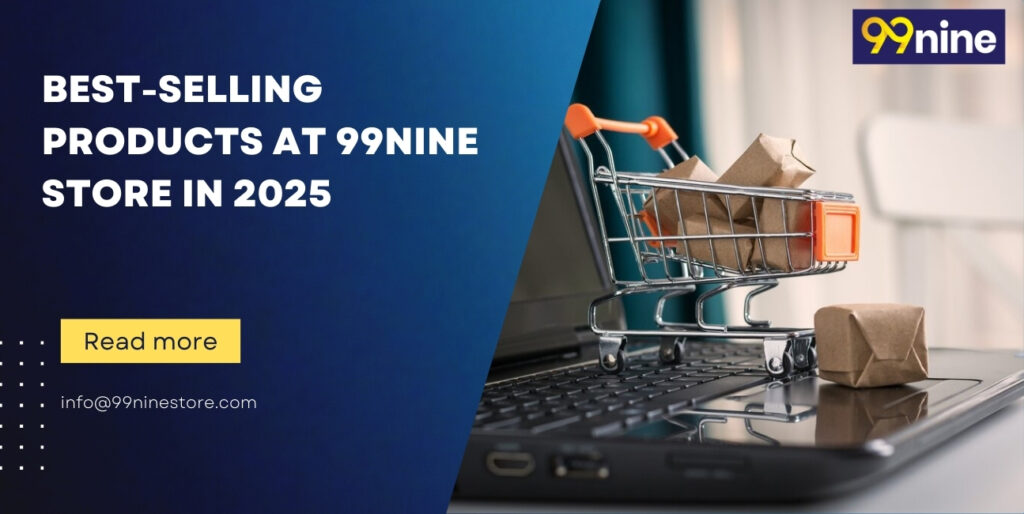Best-Selling Products at 99nine Store in 2025
Best-Selling Products at 99nine Store in 2025 Walking into a 99nine Store feels like discovering a retail treasure hunt. In the bustling markets of India where e-commerce giants continuously vie for screen time, this brick-and-mortar chain has quietly revolutionized how middle-class Indians shop for daily essentials. With over 30 physical outlets across 25+ cities—from metropolitan hubs like Mumbai and Delhi to emerging centers like Coimbatore and Lucknow—99nine Store has become the go-to destination for savvy shoppers who prefer to “see before they spend.” Let me take you through the aisles of what makes this uniquely Indian retail concept so popular in 2025, and why certain products simply fly off their shelves faster than fresh jalebis at a festive mela. Why 99nine Store Remains a Hub for Physical Shopping in 2025 At a time when nearly everything can be ordered online with a few taps, what makes thousands of Indians still queue up outside 99nine Store outlets every weekend? The answer lies in the retail experience they’ve crafted—something distinctly different from the clinical efficiency of e-commerce. Each 99nine Store maintains its signature price range of ₹99 to ₹999, making quality products accessible without the dreaded “delivery fee” or “minimum order” barriers that online platforms impose. Market research firm RetailScape India noted in their March 2025 report that despite e-commerce penetration reaching 67% in urban India, specialized affordable retail chains like 99nine Store saw footfall increase by 23% year-on-year. “There’s something deeply satisfying about picking up a kitchen tool, testing its grip, and knowing it’s coming home with you that very minute,” says Reena Sharma, a loyal 99nine Store customer from Pune. This sentiment echoes across demographics—from college students furnishing their first PG accommodations to joint families equipping their homes with affordable essentials. While the company maintains a comprehensive website (refreshed quarterly with new product categories), it serves purely as a marketing platform rather than a sales channel. The site helps shoppers discover what’s available before making the trip, but the actual purchase experience remains refreshingly old-school—complete with the satisfaction of immediate ownership that same-day delivery simply can’t match. Shopping Smart at 99nine Store Without the Digital Crutches In an era where many of us won’t order a plate of pani puri without checking its online rating, shopping at 99nine Store offers a return to more instinctual consumer behavior. Since the chain doesn’t provide online reviews or operate through an app, here’s how the smartest shoppers make the most of their visits: Visit during weekday mornings (preferably Tuesday or Wednesday between 11 AM and 2 PM) when stores are least crowded. This allows for more leisurely browsing and better access to staff recommendations. Weekend crowds, especially in metro locations, can make it challenging to properly inspect products. Build rapport with store associates—many of whom have worked at the same location for years. Unlike the algorithm-driven recommendations of online platforms, these individuals know exactly which stainless steel tiffin box has the most reliable locking mechanism or which bamboo cutting board won’t warp after washing. Look for the distinctive orange “New Arrival” tags that indicate products added within the past fortnight. These items are typically placed on end-caps or special display tables near the entrance. Check manufacturing details carefully. While all products undergo quality checks, items from certain manufacturers like Suhana Plastics (Maharashtra) and Bhavani Kitchenware (Tamil Nadu) have built reputations for exceptional durability at entry-level price points. Pay attention to the store’s rhythms. Seasonal goods typically arrive two weeks before major festivals, while home organization products see fresh stock early in the calendar year to coincide with the post-Pongal/Sankranti cleaning tradition in many Indian households. What’s Actually Selling: Top Product Categories at 99nine Store in 2025 Kitchen Corner: Where Functionality Meets Affordability The kitchen section continues to be the crown jewel of 99nine Store, accounting for nearly 40% of overall sales according to store managers. The range combines traditional Indian cooking needs with contemporary design sensibilities: Regional Cooking Tools (₹149-₹399): The South Indian filter coffee maker (₹299) and the multi-purpose belan-chakla set (₹249) remain perennial bestsellers. The newly introduced Gujarati gathering (stackable spice container system) priced at ₹399 has seen remarkable uptake since its February launch, with most stores reporting stockouts within days of restocking. Chai Culture Collection (₹99-₹349): This curated line of tea strainers, kulhads with matching saucers, and insulated tumblers celebrates India’s tea-drinking ritual. The stainless steel cutting-chai glasses with copper bottom (₹299 for a set of four) have found their way into both modest apartments and luxury homes, proving that certain classics transcend economic boundaries. Tiffin Solutions (₹199-₹799): From school children to office-goers, the Indian tiffin tradition remains strong despite the rise of food delivery apps. The leak-proof three-tier steel tiffin (₹499) and the microwavable glass lunch container set (₹799 for a set of three) compete for the attention of working professionals, while the compact roti box with separate sabzi compartment (₹249) remains popular with school children. Steel Supremacy (₹149-₹699): The traditional Indian preference for stainless steel kitchenware shows no signs of waning. The recently introduced hammered-finish katori set (₹399 for six pieces) and the multi-purpose serving tray with partition (₹349) have joined the ranks of bestsellers previously dominated by the classic steel water bottle (₹199-₹399 depending on capacity). Eco-Friendly Innovations (₹99-₹599): With plastic reduction becoming a priority across India, coconut shell serving bowls (₹199 each), bamboo cutlery sets (₹299), and banana leaf pattern melamine plates (₹499 for a dinner set of four) represent the growing eco-conscious segment that blends sustainability with Indian aesthetic sensibilities. Personal Care: Indigenous Ingredients Meet Modern Packaging The personal care section has transformed from a small corner to a major department, reflecting India’s growing self-care consciousness: Ayurvedic Essentials (₹99-₹399): Products featuring traditional ingredients like neem, turmeric, and aloe vera dominate this category. The standout performer is the cold-pressed mustard oil hair treatment (₹299) that combines grandmothers’ wisdom with contemporary packaging. Similarly, the ubtan face pack powder (₹199) which requires mixing with raw milk or curd before application connects younger shoppers with traditional beauty






